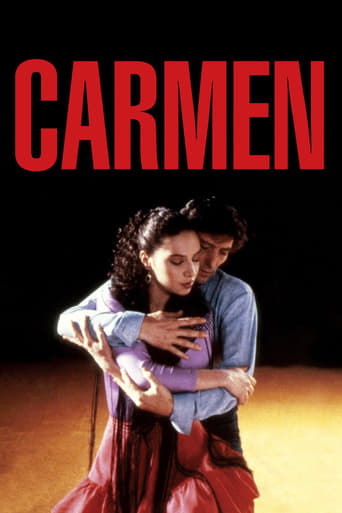bogyo-3
This is a wonderful film! Full of passion, music and drama. It follows the story of the opera of the same name. Even Carmen-haters will agree that this is a version that overcomes the boredom bred of familiarity and infuses new life into this overproduced work.The setting is a flamenco school in Spain, and the search is on for the star of a production of a flamenco Carmen. The director finds, and then falls in love with his new leading lady. The complications arise from there, from some unhappiness on the part of the best dancer in the troupe who feels she should be the star and not the newcomer, and from the storyline of the opera.The director of the film is the real-life director of one of the most famous dance schools in Spain, and the dancers, except for the character of Carmen, are members of the school.The dancing is exciting and dangerous, the story, though very familiar, attains fresh vigor in the new setting, and is altogether one of the best films of the eighties.
stevenfain
The movie within the movie - a concept done many times in the history of cinema. It is accomplished here as well as in any.If you love Carmen, you'll love this version.If you love flamenco, you'll love this version.The plot of the classic opera is played out in the actual rehearsal of the opera by a flamenco troupe. The music is authentic. The direction wonderful.If you like dancing, you'll love this version.There is tragedy. There is passion. There is intrigue.There is...Carmen.
Geofbob
On the face of it, Carlos Saura's 1983 Carmen is simply yet another version - to join dozens of others - of Bizet's world-famous opera, using flamenco music and dance, and a modern story-line, alongside elements of the opera. Following in the footsteps of many a Hollywood musical, Saura sets his story in the period of rehearsal before a new production, except in this case there is no successful opening night as the climax of the movie, but a tragic death echoing the opera. The music and dancing are dramatic, passionate and exciting, especially for those of us who love flamenco; and the weaving together of the modern characters and plot with those of the opera is effective, if somewhat contrived. There is, however, an ironic aspect to the film. Possibly no country in the western world has a stronger culture than Spain. Spanish food, drink, language, literature, music, dance and much else are unique and immediately identifiable. Yet one of its national icons - the free-spirited gypsy Carmen, who seduces and abandons men at will - is a totally French creation. Bizet, who never set foot in Spain, based his 1875 opera on a story by Prosper Merimée, also a Frenchman; and no matter how Spanish his music sounds, it is merely imitation. So for Saura to base a film on Carmen has a significance not shared by the other two films in his "flamenco trilogy" - Blood Wedding and Love the Magician - where the originals are quintessentially Spanish.It is tempting therefore to regard the film as a kind of reclamation for Spain of Bizet's pseudo-Spanish Carmen. And certainly in the adaptation for guitar of some of Bizet's music, and in the translation to flamenco dance of some of the action of the opera, such a reclamation or reconciliation has taken place. But I for one wish that Saura had gone further; had deconstructed the original stereotypes; and had shown that by the late 20th century José had grown up, and could refrain from knifing Carmen, no matter how Spanish he might feel and how free-spirited she might be. In other words, perhaps a happy Hollywood ending would not have been such a bad idea!
docraven
Carlos Saura's Carmen is one of the finest achievements in world, let alone Spanish, cinema. It manages to excite interest in flamenco in its wonderful staged adaptations from Bizet with powerful physical force. At the same time we see the impact of the creation and rehearsal of a new interpretation of Carmen on the choreographer/director and the principle dancers. The fine line between life and art is dazzling.





